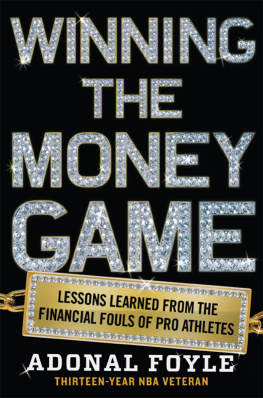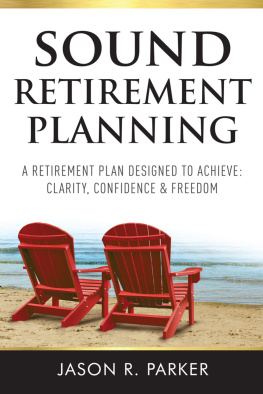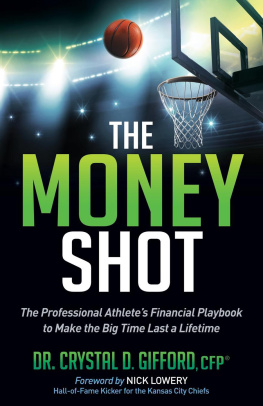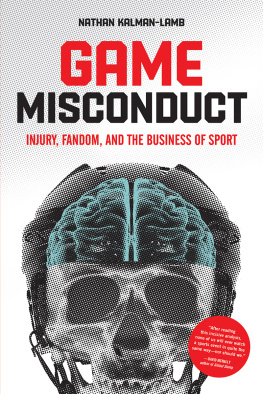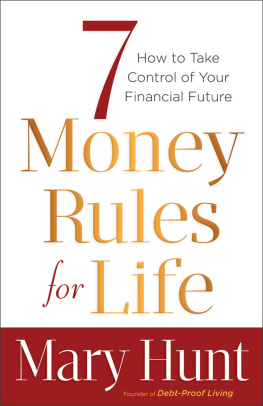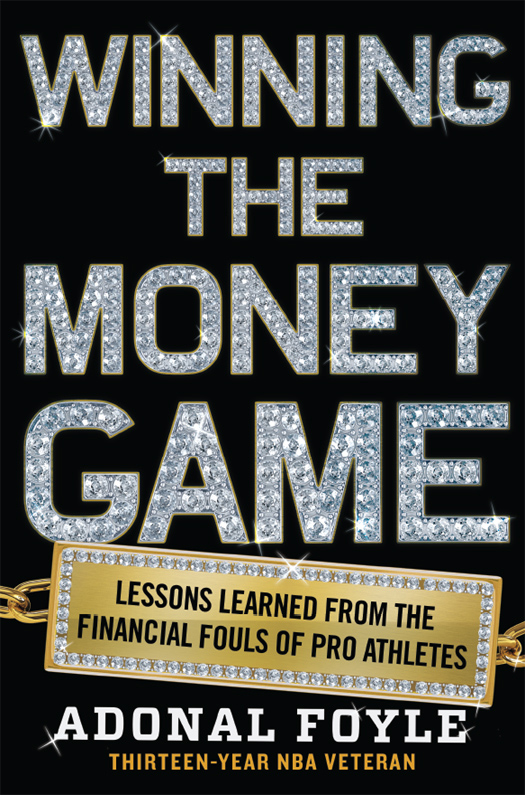To my mother, Patricia Foyle, and to my stepparents, Joan and Jay Mandle. In a world where many people do not have parents, I have three wonderful people who care for me greatly.
CONTENTS
Guide
I believe that things happen for a reason and that meeting Adonal Foyle was not a coincidence. After seven seasons in the NBA and playing alongside dozens of teammates, I can say with confidence that Adonal is one of the most well-rounded individuals I have met. As teammates from 2007 to 2010, we spent countless hours sitting together on the team plane and having dinner on the road.
One of the ways Adonal Foyle stood out was his willingness (and eagerness) to become a student and learn. Just as he was a student of the game of basketball, he also became a student of his finances. Our talks about money sparked my own interest in improving my financial literacy and guaranteeing that I was doing everything I could to secure my future.
Adonal is in the position of authority and expertise to write Winning the Money Game because he has handled his money the right way. I have personally witnessed him making weekly financial plans, preparing his taxes months before they were due, securing himself for a successful life after basketball. Because of Adonal, I believe that taking control of my finances is not a choice or a luxuryit is a responsibility. My time as an NBA athlete will one day come to an end, and I will be fiscally prepared.
It is a sad fact that over 50 percent of NBA players are broke within five years of retirement. Part of the problem is that we are not doing a good enough job of educating ourselves on finances. Winning the Money Game not only explains why professional athletes go broke but also provides practical tips and examples of how NOT to go broke. Throughout the book, the examples of Steady John and Big Baller Tom paint a perfect picture of what pitfalls to avoid and what steps to take to save and protect your money.
Winning the Money Game is a wonderfully detailed book about the monetary circumstances of NBA players. Almost none of us come from wealthy families. The vast majority of us do not even come from middle-class families. Instead, we sign multimillion-dollar contracts as twenty-year-olds with little or no financial knowledge. While all of us would admit that we are blessed, at times it is a tough road to navigate. With the help of this book, I believe we can navigate that road with more success and ensure success in our post-NBA lives.
I am fortunate that Adonal is my friend and mentor. I have sought him out for advice numerous times. While not all of us can have a personal relationship with him, this book is full of his wisdom and experience. I would recommend Winning the Money Game to any NBA player, athlete, entertainer, or young professional. It is a great guide and should be used as a tool for success!
J. J. Redick, guard, Los Angeles Clippers
W e roll up to the club in a Bentley. All eyes are on us as we stroll toward the door in our Tom Ford suits. We know were going to get comped at the door. We play for the Orlando Magic and they comp us every time. Of course, in the minds of my teammates being comped at the door means more money to spend at the bar! But thats not how I play it. I dont believe in wasting money, period.
As an NBA player, it is easy to get wrapped up in a lavish lifestyle. When we go to the airport, people carry our bags. We travel on chartered planes to various locations where strangers offer us handouts. At restaurants, everyone wants to buy us a meal. Women throw themselves at us, some of them willing to do anything just to be close to us. Admittedly, the lifestyle can become intoxicating.
NBA players live a life of fame and full-out fortune. Well-known and recognizable on the street, the average basketball player earns $5.15 million per year. Its no wonder these twentysomethings are all over the club scene, hotels, strip clubs, and anywhere else women congregate. Its a nonstop party.
I played in the NBA for thirteen years, and over those years I saw extravagances that you would believe a movie director dreamed up, from makin it rain thousands at a time, to pouring Mot on naked women. Its all part of an athletes lifestyle.
Most players live in mansionslarge mansions. If you were to pop over to visit LeBron James, you would enter a 30,000-square-foot mansion near his hometown of Akron. He has a sports bar inside his house. He has an aquarium and a barbershop. He also has an online casino in case youre feeling lucky. The master bedroom suite includes a two-story walk-in closet. I cant imagine the amount of clothes itd take to fill that up.
It is standard fare for an athleteand other entertainersto have pools, saunas, and even guesthouses. Many players take it to a whole other level with luxuries such as large fish tanks built into the wall or expansive recreational areas with pool tables and bars. They have a garage that can hold ten cars. They have a banquet-size dining room, an indoor basketball court, a bowling alley, and, for some, even a football field.
With a home like this, why would you ever leave? For a vacation, of course. Traveling and spending on lavish vacations are not foreign to athletes. Players travel extensively during the off-season, visiting exotic islands with their girlfriends or wives. With the entire summer off, players have considerable time to come up with new adventures.
Custom cars are pretty common with players around the league, too. Classic Impalas, custom Benzes, and brand-new Bentleys are all cars you see in the player parking lot at any practice facility.
In short, players create a dream life. It seems that they have it all. LeBron is not the only pro athlete with an aquarium. Dare I say theyre fairly common? Kobe Bryant amped it up by having a shark tank inside his California mansion. He also has the standard swimming pool, spa, outdoor kitchen, and fire pit. Step inside and youll find an 850-square-foot home gym, a home theater, and, of all things, a hair salon.
This is a lifestyle we see on television and in movies. Aside from the superrich or the people weve been referring to lately as the One Percent, this lifestyle is out of reacheven for guys making an NBA salary. Players often stretch the money they earn too far by purchasing big homes and fancy cars when that money, earned over a few short years, is supposed to last a lifetime. An $8 million contract is not enough money for you to buy a $4 million home, but no one ever explains this to young guys in a way that gets through to them.
Most athletes dont make the kind of money LeBron and Kobe pull in, but attempt to live as though they do. Buying a million-dollar home means paying taxes on that million-dollar home. It means maintaining that million-dollar home, including repairs, housekeeping, and utility bills. Is there a pool? Pool maintenance is not cheap. Nor, I would imagine, is the upkeep of a hair salon!
When regular Joes become superrich overnight, whether theyre rookie athletes or Powerball winners, most of the time they dont know how to handle the money and within a few short years end up broke or, worse, in debt. This happens simply because they didnt have a plan to maintain their money before they got it. Most just have a plan on how to spend it. Starting in childhood, everyone has daydreamed about what he or she would do with a million dollars. We have countless ideas when it comes to creative ways to spend money, and people who started with little or none often try to put all of their dreams into play at once.

